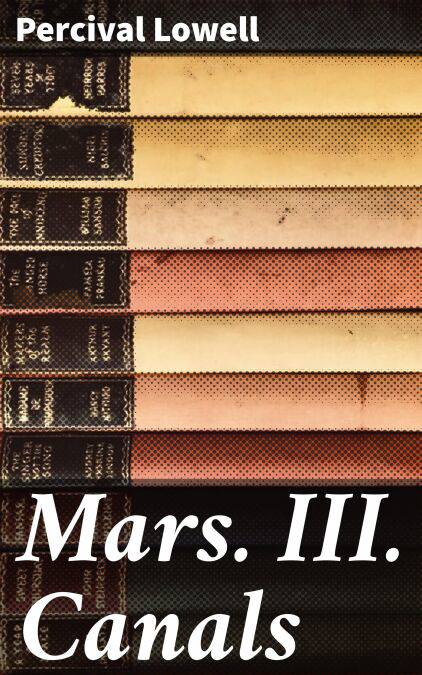
- Retrait gratuit dans votre magasin Club
- 7.000.000 titres dans notre catalogue
- Payer en toute sécurité
- Toujours un magasin près de chez vous
- Retrait gratuit dans votre magasin Club
- 7.000.0000 titres dans notre catalogue
- Payer en toute sécurité
- Toujours un magasin près de chez vous
Mars. III. Canals EBOOK
Unraveling the Mysteries of Martian Canals: A Journey into the Speculative World of Percival Lowell
Percival Lowell
Ebook | Anglais
1,99 €
+ 1 points
Description
Percival Lowell's work, 'Mars. III. Canals', is a groundbreaking exploration of the mysterious canals observed on the surface of Mars. Published in 1906, the book delves into the scientific analysis and speculation surrounding the possibility of intelligent life on the red planet, as indicated by the intricate network of canals described by Lowell. His meticulous observations and detailed maps of these features contribute to the growing body of knowledge about Mars during a period of intense astronomical interest. Lowell's writing style is both scientific and speculative, weaving together empirical data with imaginative hypotheses, reflecting the scientific spirit of his time. The book is a significant contribution to the history of planetary studies and continues to inspire modern research on Mars. Percival Lowell, a renowned astronomer and author, was a pioneer in the study of Mars and a key figure in popularizing astronomy in the early 20th century. His fascination with the possibility of life on Mars drove his extensive observations and publications on the subject. Lowell's background in mathematics and astronomy, combined with his keen interest in speculation, provided the foundation for his groundbreaking work on Mars. For readers interested in the history of astronomy, planetary science, and the search for extraterrestrial life, 'Mars. III. Canals' by Percival Lowell is a must-read. This seminal work offers a unique insight into the scientific beliefs and theories of the early 20th century, making it a valuable resource for scholars and enthusiasts alike.
Spécifications
Parties prenantes
- Auteur(s) :
- Editeur:
Contenu
- Nombre de pages :
- 21
- Langue:
- Anglais
Caractéristiques
- EAN:
- 4064066460358
- Date de parution :
- 10-04-21
- Format:
- Ebook
- Protection digitale:
- Digital watermarking
- Format numérique:
- ePub

Les avis
Nous publions uniquement les avis qui respectent les conditions requises. Consultez nos conditions pour les avis.






